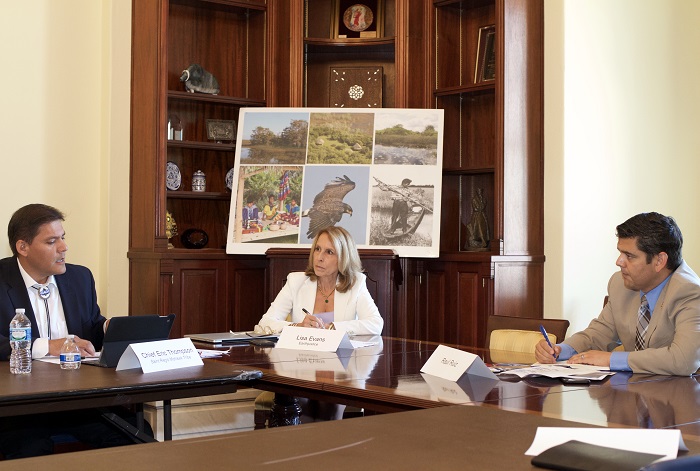Congressman Ruiz Collaborates with Indian Country to Address Environmental Injustice Concerns

(Pictured left to right: Chief Eric Thompson, St. Regis Mohawk; Lisa Evans, Earth Justice; and Congressman Raul Ruiz, D-CA)
Recognizing the disproportionate impact of environmental injustice in Indian Country and minority communities in general, Congressman Raul Ruiz (D-CA) held a roundtable on June 14 to hear directly from tribal leaders on ways that Congress can work collaboratively with tribes to overcome challenges faced in environmental mitigation efforts and raise awareness about the impacts that the development industry has on tribal lands, trust resources, and the health and well-being of tribal communities. Congressman Ruiz was joined by Congressman Raul Grijalva (D-AZ), Congressman Patrick Murphy (D-FL), Congressman Mark Takano (D-CA), Lisa Evans, Senior Administrative Counsel at Earthjustice, and representatives from the St. Regis Mohawk, Miccosukee Tribe of Indians, Puyallup Tribe of Indians, Ponca Tribe of Nebraska, Red Lake Band of Chippewa Indians, and the Navajo Nation.
Environmental Injustice in Indian Country
Weaved throughout each tribe’s presentation was an absence of adequate and meaningful consultation, especially in the cases where off-reservation or off-territory development directly impacts on-reservation resources; lack of adequate levels of funding to effectively monitor and mitigate pollutants; and the inability to successfully assert tribal priorities over existing funding resources.
The St. Regis Mohawk tribal leadership raised concerns about the impacts of two off-reservation Superfund sites and one area of environmental concern, which are located directly upstream and upwind from where the Mohawk people draw their drinking water and reside. Hazardous substances, including polychlorinated biphenyls along with volatile organic compounds contaminating the air are leaving a toxic legacy and a disproportionately high prevalence of diabetes, thyroid disorders, asthma, arthritis, autoimmune disease, heart disease and cancers. Despite active tribal engagement with EPA, current methods for cleanup are insufficient and the recommendations of the St. Regis Mohawk to improve mitigation efforts have been disregarded.
The Miccosukee Tribe of Indians and the Puyallup Tribe of Indians raised concerns about the lack of consultation for off-reservation development projects that directly impact their resources. The Miccosukee are primarily concerned about private investments that would use large amounts of water and damage environmentally sensitive areas in the Florida Everglades. The Puyallup Tribe echoed the concerns of many Northwest Indian tribes about the need for meaningful consultation with the Army Corps of Engineers when it exercises permitting authority under the Clean Water Act (CWA) or otherwise takes actions that would impact treaty-reserved fishing rights.
The Ponca Tribe of Nebraska spoke the lack of consultation when it comes to including tribal insight on the development or mitigation practices of traditional territories and cultural sites. An example was given regarding the dredging of a portion of the Missouri River without any consultation with tribes, which resulted in significant damage to cultural and archaeological sites of various Great Plains area tribes.
The primary concern of the Red Lake Band of Chippewa Indians is the increasing levels of mercury contaminants in freshwater fish in Minnesota, where the Red Lake Band runs the oldest freshwater fishery in the United States. These contaminants are the product of coal-fired plants globally and have been linked to brain and nerve damage resulting in state-wide consumption advisory warnings for children and women of child-bearing age. Given that roughly half of the Red Lake Band’s population is under 21, and current data suggests that Band members consume fish up to 5 times more than the general population, it is important that the Red Lake Band is able to effectively monitor and mitigate the adverse impacts of mercury contaminants to protect the Band’s tradition of subsistence living, the health and well-being of Red Lake Band members, and the economic security of the Band.
The Navajo Nation spoke to the unacceptable prevalence of abandoned uranium mines on the Navajo Reservation, which contaminates drinking water sources with elevated levels of radiation. While the Navajo Nation has worked closely with EPA and other agencies including BIA, the Nuclear Regulatory Commission, Department of Energy, and the Indian Health Service since 2007, uranium contamination is widespread and will take many years to address completely. Without adequate resources and continued relations, the Navajo Nation is unable to protect the well-being of its members.
Moving Forward
Tribal leaders and representatives expressed their support for Congressman Grijalva’s RESPECT Act, which aims to codify procedures for effective consultation and coordination by federal agencies with federally recognized tribes. Additionally, tribes proposed an increase to the tribal set-aside for EPA Section 106 CWA funding; the extension of self-governance to relevant EPA programs in an effort to streamline existing funding and provide tribes with the authority to better assert tribal priorities; and requested support for a more formal investigation on the sufficiency of current EPA funding, mitigation efforts, and programs impacting Indian Country. Tribal leaders look forward to continue working with Congressman Ruiz and members of Congress on solidifying pathways to address these concerns.
